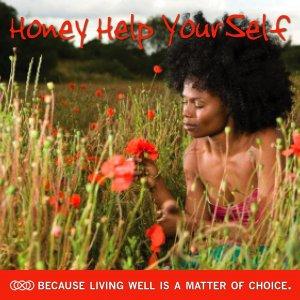Honey Help YourSelf

Kissing Sugar Goodbye
On January first I started a 21-day no-junk food diet. I'd been threatening to starve my sweet tooth for weeks—having spent the holiday season high on sugar—so, when a Facebook friend threw out the challenge, I answered. But I knew that if I was going to do it well, I'd need help.
So I reached out to my friend, healthy eating expert and activist, Judy Lendsey. She’s seen some major transformations in her own life and in the lives of her clients through her nutrition and wellness work. Her passion stems from her own journey with cancer—and kissing sugar goodbye. Granted, Judy's experience is her own, and while she's not suggesting that laying off sweets is the cure for all that ails us, she offers lots of good food for thought.
We talked on topics ranging from sugar to smoothies, greens to the government, relationships, advertising, addiction, personal responsibility and more. By the time we were through, kicking the sugar habit was the least of my concerns.
What follows is the short version of our conversation. To hear the extended version, click on the podcast player above.
∞ ∞ ∞
What brought me to the work I do was a cancer diagnosis in 2001. I went through conventional treatment because I didn’t know what I didn’t know about my body, how I got cancer and how I participated in creating that environment in my body. I successfully completed conventional medicine and chemotherapy; it was not a fun experience—and I don’t know anybody who goes through it that enjoys it—but it led me to a place where I really took a hard look at myself and what I was doing to contribute this space inside my body—and out—that was so toxic.
I remember specifically sitting in the room where I was getting treatment. Next to the recliner was a hanging bag of fluids that were entering me through an IV. Some had medications and others were to hydrate me because I was so sick. I remember specifically sitting in that room thinking, What’s the difference between why I got cancer and that guy over there or that woman who got it—why are some of us going to make it and some of us not? It’s said that we’ve all got it somewhere in our bodies, but it really got me thinking about what I could do to eliminate it in my body. I know I participate through my fork, through my cleaning products, the products I put on my skin, what I wash my clothes or my floors with and anything like that. The whole experience really had an effect on me and made me look at the things I could change.
I participated in one of those Relays For Life, it was a cancer fundraising event. The first year I was asked to arrive early to what was called a ‘survivors’ walk’ and take a lap around the track with other survivors. I got there and we’d been fundraising and getting together having meetings prior to the thing—so there’d been some build up to the event beforehand. We wore different colored T-shirts so we’d stand out. I’m thinking there were going to be 200 of us survivors, but there were only eight. Eight people walking around this track. And that—it just took the breath out of me. I was thinking, Something is very, very wrong here. Why are there only eight of us? What is really going on here?
There were all these little luminaria bags set up around the track with the candles in them—they had notes to the loved ones who’d passed on—and I think I cried the whole way around the track. To think that we’d come to this.
That's when I really started to read a lot of books and visit with people who recommended a lot of different things. Two of the most powerful things they said was that cancer can’t live in an alkaline environment—so I did my best to learn about what that was and how I’d been participating in that—and that cancer is a protein that feeds on sugar.
It didn’t take me long to hypothesize that I am the number one person who could control the amount of sugar I put in my mouth and that I coul






 Visit Podcast Website
Visit Podcast Website RSS Podcast Feed
RSS Podcast Feed Subscribe
Subscribe
 Add to MyCast
Add to MyCast